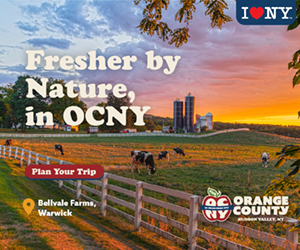For the regional brewer looking to produce a more sustainable beer, finding a local source of hops is key. It’s not as easy as it once was. In the mid-1800s, New York was one of the top-producing states, but hops farms eventually succumbed to competition, blight, and Prohibition.
Enter Arrowood Farms in Accord, with Blake Arrowood (farmer), left, and Jacob Meglio (brewmaster) at the helm. Arrowood is the first farm brewery in New York growing certified organic hops. They produce six different varieties that go directly into Arrowood Farms products – a selection of ales, stouts, lagers, and seasonal beers.
Since their first planting in 2014, they’ve taken an earth-conscious approach. The brewery and tasting room are located in the middle of the farm. These visitor-friendly facilities are part of a larger, holistic system – the ducks create compost, the sheep eat foliage to improve air flow and mitigate disease, and the pigs are fed grain spent from brewing.
Blake and Jacob are proving to be a successful case study for other Hudson Valley craft beverage producers to consider. For this issue of Talking Terroir, we asked them about their process.
Q: What does it mean to be called a “farm brewery”? What made you decide to start one?
A: When starting the farm, we quickly realized we needed to produce a value-added product to sustain it – beer was the natural choice. The newly-passed New York State farm brewery legislation incentivized farmers to grow, and brewers to brew with, New York ingredients. Anyone can be a “farm brewery” meeting the current guidelines, which require you to use at least 20% of state-grown ingredients. It will be 60% by the start of 2019, and in 2024 it increases to 90%.
But we took to creating a true farm brewery in every sense – establishing the farm as our foundation, growing our own hops and grain, plus raising animals that fit into our system in the most biodynamic and sustainable way. These systems all work together to create the best beer we can possibly make, representing the essence of our farm and region.
Q: How difficult is it to grow hops?
A: It’s a fairly demanding crop to produce. Hops are susceptible to all the natural elements, just like any other agricultural crops. The biggest factor affecting how the plants grow is the weather. This year in particular it’s been very difficult due to the drought. Hops take four years to mature; we’re in our second year. It takes a lot of work to create the trellis system that hops grow upon, and the annual maintenance is labor intensive.
Q: Do you think the region will see more hops farms opening to supply all of the new breweries cropping up?
A: Absolutely. We’re already seeing an incredible resurgence in growing hops, plus loads of small breweries opening up all over. New York is really doing a wonderful job incentivizing growing hops and grains, and creating the small business breweries to utilize them. With all the hard work and demand it takes to grow and create, in the end it’s one of the most rewarding experiences.
Q: How does it benefit breweries in the region to use locally-grown hops?
A: When we talk about sustainability, we’re talking about community as well. To grow in the Hudson Valley, to brew in the Hudson Valley, to create a successful business in the Hudson Valley is good for our communities and true to the philosophy of sustainability.
Q: In addition to using geese and sheep to help the crop, what other sustainable business practices do you follow?
A: We also raise bees; currently 15 hives. The bees pollinate our wildflower meadow on the farm, and we’ll be using their honey in upcoming brews. Our brewery is 100% solar—the panels live on the roof—so we’re currently net zero. Our kettles are all electric, so our beer and our farm are powered by the sun. We’re trying in every way to create the most sustainable and delicious beer possible.
Q: What are your future plans for your farm?
A: We aim to partner with other farms and hop growers in our area, working together to grow the highest quality hops possible. We’re also growing certified organic grain. Our first harvest, ten acres of rye, turned out beautifully. We’re also looking to grow native herbs, fruits and nuts on our farm – ingredients that we’ll use to create a really local and interesting beer.
Photo: Tait Simpson





